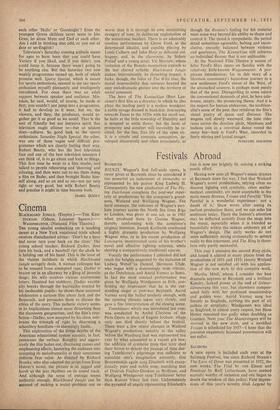Festivals Abroad
BAYREU'TH
RIENZI,. Wagner's first full-scale opera, is never given at Bayreuth since he considered it too powerful an indictment of monarchy as represented by his patron King Ludwig 11. Consequently the new production of The Fly- ing Dutchman completes the post-war reper- tory of productions by the composer's grand- sons, Wieland and Wolfgang Wagner. The lurid seascape, the outcome of Wagner's peri- lous journey across the North Sea from Riga to London, was given in one act, as in 1901 when produced there by Cosima Wagner, thereby conforming with the composer's original intention. Joseph Keilberth conducted a highly dramatic production by Wolfgang Wagner who, as in his recent production of Lohengrin, incorporated some of his brother's novel and effective lighting schemes, while steering a comparatively traditional course.
Vocally the performance I attended did not reach the heights suggested by the inclusion of Ludwig Weber as Daland, Hermann Uhde, who began with a distressingly wide vibrato, as the Dutchman, and Astrid Varnay as Senta. In fact the most musical performance_ was given by Wolfgang Windgassen as 8rik, con- firming my impression that he is the out- standing singer at post-war Bayreuth. Astrid Varnay sang the ballad tenderly enough, with the opening phrases taken very slowly, and gave a fine interpretation of the closing scene.
Tannhduser, which was introduced last year, was conducted by Andre Cluytens of the Paris Opera in place of Eugene Jochum, whose only son died shortly before the festival. There were a .few minor changes in Wieland Wagner's production, notably in the valley before the Wartburg that was represented last year by what amounted to a vacant gilt box; the addition of symbolic trees that later shed their leaves to denote the passage of time dur- ing Tannhauser's pilgrimage was sufficient to stimulate one's imagination correctly. Gre Brouwenstijn again sang Elisabeth with excep- tionally pure and noble tone, matching that of Dietrich Fischer-Dieskau as Wolfram, and Wolfgang Windgassen sang Tannhduser better than Ramon Vinay last year. Unfortunately the pyramid of angels representing Elisabeth's bier is now too brightly lit, ruining a striking poetic effect.
Having now seen all Wagner's music dramas at Bayreuth since the war, I feel that Wieland Wagner's novel productions, relying often on discreet lighting and symbolic, often mathe- matical, continuity, are most acceptable in the static music dramas, Tristan and Parsifal. 'This Parsifal is a wonderful experience: not a doubt of it,' Shaw wrote after seeing its earliest production there, and we can echo his sentiment today. There the listener's attention may be deflected suitably from the stage into the music, especially when it is blended so beautifully within the sunken orchestra pit of Wagner's design. The early works do not seem sufficiently strong orchestrally to submit easily to this treatment, and The Ring is there- fore only partly successful.
This year I attended the second Ring cycle, and found it altered in many places from the productions of 1951 and 1953; clearly Wieland Wagner is not satisfied yet with his applica- tion of the new style to this complex work.
Martha MI:WI, whom I consider the best dramatic soprano at Bayreuth and a brilliant Kundry, lacked power at the end of Goner- diimmerung this year, but elsewhere compen- sated fully with her profound musicianship and golden tone. Astrid Varnay sang too fiercely as Sieglinde, robbing the part of all pathos or simplicity; Windgassen was ideal as Siegfried, in almost every respect, but Hans Hotter remained too godly when doubling as Gunther. Next year The Mastersingers will be revived in the new style, and a modified Tristan is scheduled for 1957—I hope that the previous exquisitely balanced presentation will not suffer.


































 Previous page
Previous page